Pieter van Dijk, born in Poeldijk (the Netherlands) is the Chief Operating Officer at Ontario Plants Propagation. He spent a lot of time in the Netherlands this spring, due to the coronavirus.
Right away it was a great opportunity to shop around for new installations for the expansion of the Canadian propagation company. Two Limex washing machines, for example, one for Danish trolleys and one for bins and trays. "In view of the ever-increasing virus pressure, a necessity."
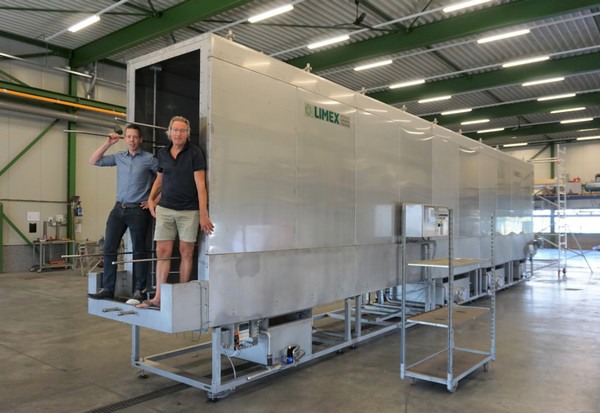
Joep Janssen of Limex and customer Pieter in early August, standing on a unique trolley washer
For years, Pieter was a tomato grower and later he worked at propagation companies, so he is familiar with the virus pressure that affects so many growers. The Tomato brown rugose fruit virus (ToBRFV) is the latest problem for growers. So far Canada has been free of the virus, to the best of his knowledge. Unfortunately, the same cannot be said for the coronavirus, which is a concern for employees and growers alike.
Growers and propagation companies want to minimize viral risk, so they, like their international colleagues, are taking precautions. "ToBRFV and Covid-19 are just very bad viruses and because the world nowadays is so interconnected, we have to take the necessary steps to minimize the chance of spread."
Advancement of covered cultivation
In this case, propagation companies will have an important role to play, says Pieter, who recently wrote a completely renewed hygiene protocol for propagation company Plantise. “Also with that in mind, I saw upon arrival in Ontario that there are still steps to be taken, including in the field of hygiene, but also with data-driven cultivation and labour registration. A great challenge, for which I have been writing all kinds of plans since February to convince the board to make investments.”
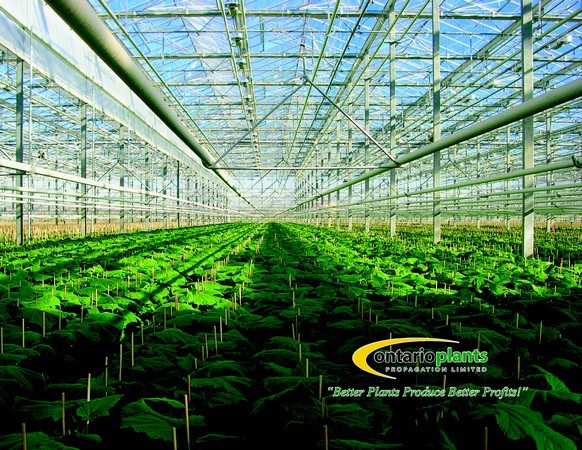
Ontario Plants Propagation is the largest propagation company in North America and will have 14 hectares this autumn after the completion of the expansion. “We are small compared to Dutch propagation companies, but Canada only has about 36 hectares of 'concrete', so about 10 percent of what the Netherlands has. 14 hectares is a lot, although we must do our best to keep up with the growth of our customers in greenhouse horticulture. The current expansion will certainly not be the last.”
Red zone
Because of the expansion of in total 2.5 hectares, also 4,000 square meters of 'red zone' and 4,000 square meters of 'green zone' will be added. That is 'quite large' by current industry standards. All bins, trays and trolleys from the production growers are returned to the red zone, so the risk of spreading of any viruses is greatest here. After all, there are a lot of hands touching the carts before they return to the plant grower and there also will have been contact with the crop, that may be contaminated. “Soon we will be able to wash the trolleys and trays very fast and thoroughly, so that we take maximum precautions. The lines resemble lines that Limex has installed at other Dutch propagation companies, although our two lines are even longer.”
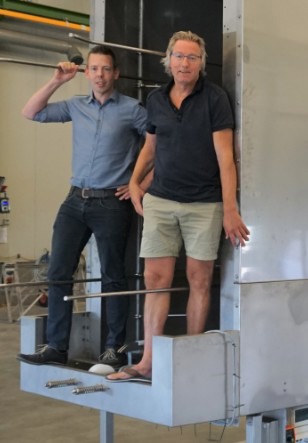 "The largest trolley washing line ever"
"The largest trolley washing line ever"
Joep Janssen, director of Limex, that is currently building the lines, even speaks of 'the largest and most intensive trolley washer that the company has ever supplied'. The installation will soon be able to wash up to 120 Danish trolleys per hour. “That's why I'm really proud of that thing,” Pieter summarizes his enthusiasm in 'Westland' style. “Adding an extra section to the line increases the contact time, which is important to effectively kill viruses such as Covid-19 and ToBRFV. If necessary, we can also reduce the speed of the belt, although you also see that increasingly more effective products are coming onto the market. That also helps, as long as there is no resistance or vaccine yet.”
Visually clean first
Of course there is more to it than just the purchase of good washing machines. The entire logistic process must be well organized in terms of hygiene. “Trolleys must first be visually clean, then you have to use soap, clean with hot water and then disinfect”, Pieter says. A major advantage in this respect, compared to the situation usually found in the Netherlands, is that Ontario Plants only works with its own trolleys.
Visual cleaning in particular is important and is sometimes overlooked once the machines are getting better, in Pieter’s experience. “A string in a wheel from a Danish cart or soil on one of the plates make all further steps in the cleaning process less effective. It is precisely in such a piece of dirt that viruses can survive and that is something that you do not want.”

Construction, mid-August
Special dock
The same cleaning story also applies to the bins and trays, for which the washing line is specially equipped with a heat exchanger to provide sufficient hot water so that up to a thousand pieces can be washed per hour. And then there are the logistical movements, because the trolleys don't come back by themselves. “There will be a special dock for trucks at the red zone, only for the delivery of trolleys and trays that return from our customers, without actually having to enter our building.”
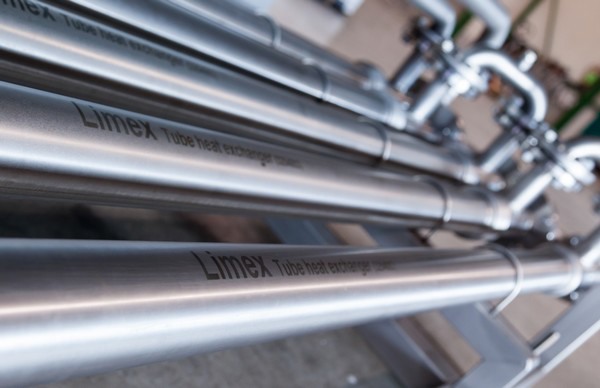
The Limex tube heat exchanger on another installation. "It's a new development, high efficiency in heat transfer and much more hygienic than old systems", Joep says.
Installation in 'cleaning month' October
If everything continues to go according to plan, the extension will be ready in October and the lines can be installed. “October is 'cleaning month' for us, so installation in that month would suit us fine. The entire propagation schedule here is almost the same as in the Netherlands, with the only striking difference that we have a longer season for cucumber propagation here. That's because Ontario is at the same latitude as the South of France and so there is a lot of intense sunlight. This makes the unexposed cucumber season extra long.”
In the near future, if the corona situation allows it, Pieter will visit that intense sun again, also to have a look at the construction up close. “When I was a grower, I always liked to do or build something new every five years. The growth that this originally Dutch-Canadian family business is now experiencing, is also going very well. I think it's a great adventure.”
For more information:
Ontario Plants Propagation
www.ontarioplants.com
info@ontarioplants.com
Pieter van Dijk
pvandijk@ontarioplants.com
Limex Machine Exploitatie 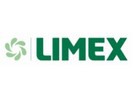
sales@limex.nl
www.limex.nl
